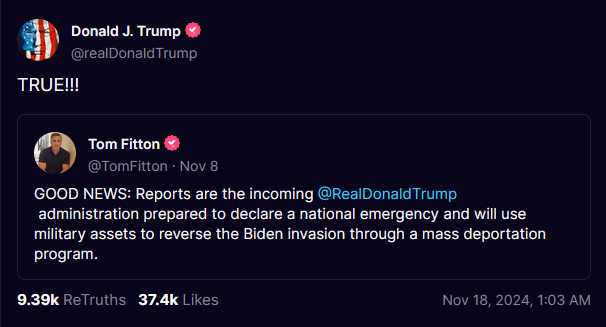 What you need to know about Presidential power during a National Emergency
What you need to know about Presidential power during a National Emergency
 On 18 November 2024, Donald Trump confirmed plans to declare a national emergency so that he can begin mass deportations when he takes office in January. Given the fact that he has done this before, and has expressed that he would be a dictator on his first day in office, it is extremely likely that he will follow through on this plan, announced on his social media site Truth Social.
On 18 November 2024, Donald Trump confirmed plans to declare a national emergency so that he can begin mass deportations when he takes office in January. Given the fact that he has done this before, and has expressed that he would be a dictator on his first day in office, it is extremely likely that he will follow through on this plan, announced on his social media site Truth Social.Declaring a state of emergency will do more than just allow him to move funds or troops for deportations: it opens up 136 new abilities to the office. Many of these emergency powers do not require any approval from Congress, and with Trump loyalists packing the cabinet and dissenting Generals out of the way, departmental cooperation would be easy.
What can Trump do with these new powers? I have broken down what I believe are the most crucial items.
First, lets assume that he only wants to use these powers for mass deportations. What statutes might he invoke and how might he use them?
- Trump is very likely to invoke the powers he used in 2019, granted by 33 U.S.C. § 2293, to divert funds and personnel.
- There are multiple provisions that open avenues for the executive branch to use public land (43 U.S.C. § 155), urban real estate (40 U.S.C. § 905), and farm property (7 U.S.C. § 4208) for use in a military or civic construction project (10 U.S.C. § 2808(a)). All of this frees up land for border detention facilities like the ones we saw in Trump's first term. Luckily, one of these statutes is limited to natural disaster relief and another requires action from the yet-unappointed General Services Administrator.
- If the administration decides that they need additional military personnel to support ICE, a national emergency allows the executive branch to pull military personnel from reserves (10 U.S.C. § 12302 (a)), retirement (10 U.S.C. § 688 (f)), or educational leave (10 U.S.C. § 708 (d)(1)). If invoked, I believe this is most likely to affect the National Guard.
- 19 U.S.C. § 1318 gives the Secretary of the Treasury the authority to "eliminate, consolidate, or relocate" any ICE office or port of entry.
What about beyond the mass deportation project? What other powers are available that Trump is likely to invoke, based on his history as a sitting president, campaign statements, and plans outlined in the 2025 Mandate for Leadership?
- Following Trump's announcement of Pete Hegseth for Department of Defense, he announced a "warrior board" that would carry out mass dismissals of military officers. Should Trump choose to replace these officers, perhaps with "people who [are] totally loyal to him," he would be allowed to appoint "any qualified person" to officer ranks up to major general (10 U.S.C. § 603)
- Trump's campaign has been clear about his intentions to impose trade restrictions and reduce America's reliance on imports. In a national emergency, with co-operation from the Secretary of Agriculture the president is allowed to impose fees and limitations on agricultural imports without oversight from the FTC (7 U.S.C. § 624 (b))
Finally, I will list a few more emergency powers that I believe are less likely to be used but still worth mentioning.
- Trump has promised to revitalize American fossil fuel industry as in line with Project 2025. While it is more likely for the new administration to use regular executive power to shut down environmental regulations, the president would be able to: temporarily suspend the Clean Air Act in a fossil fuel producing state (such as Texas) with the co-operation of that state's governor (42 U.S.C. § 7410 (f)), permit dumping of waste into the ocean (33 U.S.C. § 1902 (b)(3)(F)). He would also be allowed to make changes to the Energy and Policy Conservation Act without the usual 30 day comment period (42 U.S.C. § 6393 (a)(2)(A)).
- 10 U.S.C. § 712 (a)(3) allows the President to send US troops to "assist" a foreign country without officially sending us to war. There are other easier provisions already being used to send US troops to Israel, and it is more likely for the administration to use these existing non-emergency powers if Trump wants to do something like this.
The imminent concerns when Trump declares a national emergency will be immigration, military restructuring, and trade restrictions. It can be scary to know that there will be so many unrestricted powers in the hands of such a volatile world leader, but the vast majority of these powers are logistic in nature and will not directly affect most Americans. A national emergency is not the same as martial law, and you should not be immediately concerned about governmental violence or imminent loss of rights from this source. These larger concerns are coming, but they will happen via executive order (Trump issued 55 per year in his first term) or slower Congressional processes, not through national emergency powers. ★










